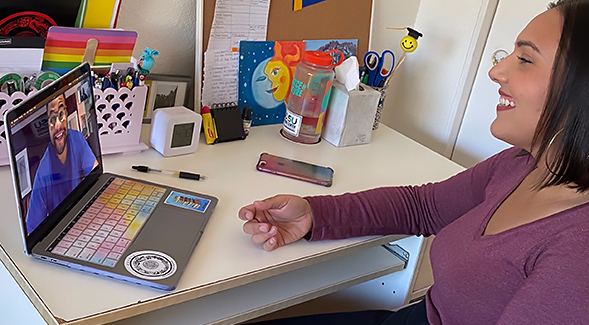More Vital Than Ever, Community Mental Health Services Move Online
With webcams and white noise, SDSU's clinics shift into virtual space to meet the growing therapy and counseling needs of low-income San Diegans.

In normal times, the Dede Alpert Center for Community Engagement in San Diego’s City Heights neighborhood is a hive of activity. In any given week, the facility on El Cajon Boulevard employs dozens of San Diego State University master’s students provide low-cost mental health services to hundreds of low-income individuals and families.
While the physical doors of the center are closed due to the COVID-19 pandemic, those services have not skipped a beat. With in-person therapy no longer possible, clinics providing community-based multicultural counseling, marriage and family therapy and early childhood mental health have shifted their services fully online.
And they may be more needed than ever.
"In light of all of the anxiety and fear that's loose right now because of COVID-19, I think it's critical,” said Nola Butler-Byrd, associate professor in counseling and school psychology and director of the Community-Based Block (CBB) multicultural community counseling program. “People are housebound 24/7 and it's a pressure cooker. They need some ways to talk through things and get some support."
“This is a really scary time and one of the hardest things for parents is to be able to know how to talk to young children about what's happening.” added Lisa Linder, assistant professor in child and family development, whose Healthy Early Years clinic works with families with children 3-5 years of age. “I think that mental health is never more relevant than in the middle of a pandemic."
Herculean Feat
When SDSU transitioned to virtual instruction in mid-March, clinic administrators were tasked with moving all services online without disrupting their students’ training or their clients’ care. That included 72 therapists from CBB and Marriage and Family Therapy (MFT) programs who handled a client load of more than 600. Down the hall at Healthy Early Years, 10 more practicum students and interns serve more than 100 families.
“Getting 72 student therapists trained to do online psychotherapy in basically a week and a half felt like a Herculean feat,” said Juan Camarena, executive director of the Center for Community Counseling and Engagement (CCCE). "We rallied together in the administration of the CBB program and the Marriage and Family Therapy program to make sure that students could do this, while also supporting the students in what they are going through."
All student clinicians have been equipped with and trained to use a version of Zoom encrypted on both ends to ensure HIPPA compliance. They have also been instructed on best practices to ensure professionalism in the virtual space, such as securing confidential spaces at home and setting up white noise machines to ensure sessions cannot be overheard.
For some programs, the transition was more seamless than others. CBB was ahead of the curve, having recently piloted a mental health tele-program that offered virtual sessions to clients of an LGBTQ shelter in Tijuana.
“Thankfully we’ve been using the software programs we need for telemental health for years as part of our pedagogy, including Zoom and GoReact, which supported our transition from in-person to online,” Butler-Byrd said.
For Healthy Early Years, which operates in a field where tele-therapy is not widely used, it meant adapting practices on the fly. But by trading one-way mirrors and in-person coaching for webcams and earbuds, they’ve made it work.
“Really a lot of early childhood mental health therapy is observing and translating what is happening for the parent and the child, so the child knows what the parent is feeling and the parent knows what the child is feeling, then supporting the parent to work with their child.” Linder said. "That can be done with a camera pointed at the play space at home.”
Mission critical
Administrators of the three programs report that the majority of clients have decided to move forward with teletherapy. Butler-Byrd said CBB is even starting to pick up clients from other providers who have temporarily shut down during the pandemic.
"I have a feeling we'll probably be up to our usual load of each of our students having two clients on a Monday night during practicum," she estimates.
No matter the numbers, the message is clear — despite the global crisis, SDSU remains ready to serve.
"It's mission critical for us as a college,” Camarena said. “We tout social justice and, to me, social justice means serving 601 clients when it's really hard. It's doing so while being as creative as possible and giving students the personal and the academic support that they need."



